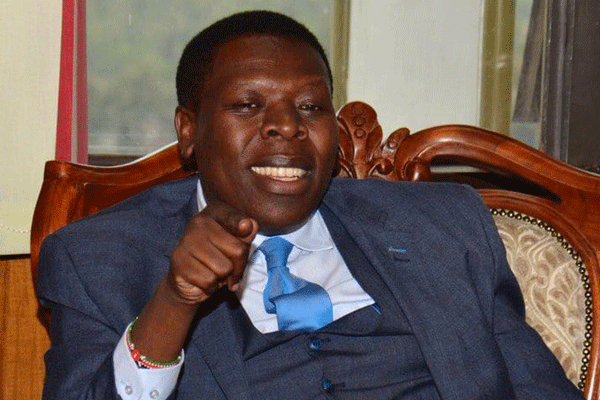Counties inherited Sh57b debts from defunct councils – report

Eric Wainaina and Kirera Mwiti
County governments inherited fixed assets worth Sh110 billion and debts valued at Sh57 billion when they took over from the 175 defunct local authorities in 2013, a report released by the outgoing Intergovernmental Relations Technical Committee (IGRTC) reveals.
Launched by Devolution Cabinet Secretary Eugene Wamalwa who handed it to the new IGRTC team during the ongoing induction workshop in Naivasha, the report shows that land and houses are top assets owned by the devolved units of governance.
Chaired by former Permanent Secretary Prof. Karega Mutahi whose term ended last week.
The outgoing team, has prepared an inventory to protect the assets from unscrupulous county officials who have been using their positions to grab them for their individual gains.
New IGRTC members are John Burugu who is the acting chairperson, Angeline Hongo, Dr Perminus Ndimitu, Linet Mavu, Alfred Khang’ati, Alice Mayaka, Saadia Kontoma and Wilson ole Pere.
Corrupt officials
Wamalwa revealed that the outgoing committee had managed to identify 62,342 parcels of land, over 70,000 buildings and 2,600 cars owned by defunct councils.
“According to the new report, counties have assets worth Sh110 billion and liabilities running to Sh57 billion and we are grateful to this committee for a job well done,” he said.
The Council of Governors chairperson, Wycliffe Oparanya will close the conference tomorrow.
Wamalwa said he saved the government about Sh3.6 billion which could have been lost during the exercise because the defunct Transition Authority (TA) had requested for Sh4 billion to undertake the process yet IGRTC only spent Sh400 million.
The disclosure comes even as it emerged that the public could have lost properties worth billions to corrupt defunct local authority officials as well as greedy county officers who grabbed land and cars as well as exaggerated bills to facilitate the public money.
Some of the areas where corrupt county officials were said to have exploited include legal fees, supply of materials and equipment as well as construction and rehabilitation of road projects that were allegedly undertaken by local authorities.
Shortly after counties took over from the local authorities, an audit revealed that assets worth Sh143 billion could have been stolen by unscrupulous individuals assisted by errant officials who took advantage of the transition gap that was occasioned by lack of a law to guide the transition to the new dispensation.
Idle land and other assets like vehicles were shared out in the months preceding the 2013 General Elections and after the polls as the government dragged its feet in allocating them to the counties.
Kinuthia Wamwangi, who chaired TA, whose three-year term ended in March 2016, in a past media interview said a well connected network looted properties before they were documented and handed over to counties.
Wamwangi said, while doing inventory for assets and liabilities in all the former local authorities in 2013, they encountered instances where individuals had stolen assets mostly land and cars after failing to reveal their existence to the authorities.
Speaking during the workshop, Wamalwa lamented the increase in disputes between the national and county governments, which are mainly as a result of devolving and management of resources as well as the functions in Schedule Four.
“We are grateful that the IGRTC has helped solve some disputes between government institutions as the government has paid millions to lawyers during court cases,” he noted.
On the current revenue allocation impasse, Wamalwa was optimistic that the Senate would help resolve the issue as soon as possible to ensure the case is disbursed to the counties to avoid the affecting of services.
Biggest challenge
“We hope that there will be sobriety in the manner that the senate debates and resolves this issue which is very critical in the running of counties,” he said.
Outgoing vice-chair Allyce Kureiya said that during the team’s tenure they had managed to resolve 11 out of 23 disputes between counties.
“The biggest challenge we faced was interference from other bodies and we hope the new team will get full support from the State,” she said.
On his part, Burugu was optimistic that they would deliver saying they will also focus on revamping the body and fostering good working relationships between the national and county governments, which have been in constant friction.
“We are ready to tackle the pending disputes between counties and we shall seek the support of the State in reaching our objectives,” he said.












